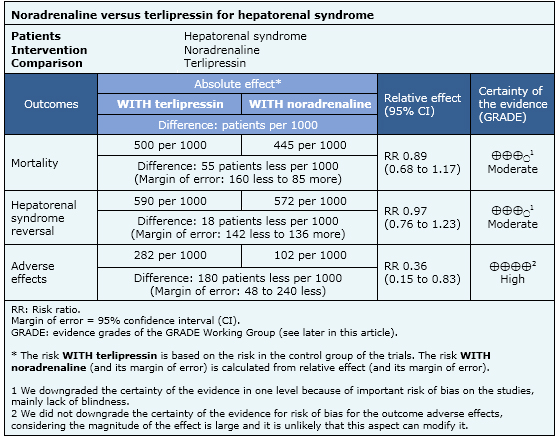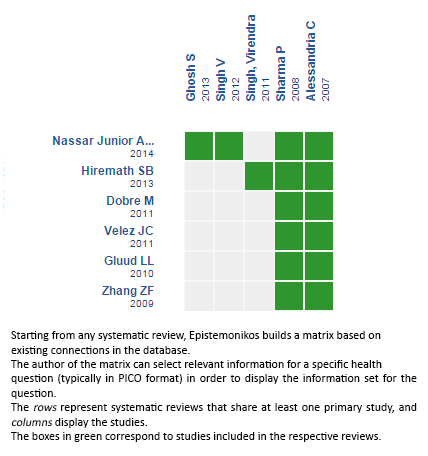Resúmenes Epistemonikos
← vista completaPublicado el 28 de agosto de 2015 | http://doi.org/10.5867/medwave.2015.6235
¿Noradrenalina o terlipresina para el síndrome hepatorrenal?
Noradrenaline or terlipressin for hepatorenal syndrome?
Abstract
Hepatorenal syndrome is a condition associated with very high mortality that may be reverted in some cases with vasoconstrictors. Terlipressin has generally been considered standard treatment, but noradrenaline has been postulated as alternative. Searching in Epistemonikos database, which is maintained by screening 30 databases, we identified six systematic reviews including four pertinent randomized controlled trials. We combined the evidence using meta-analysis and generated a summary of findings following the GRADE approach. We concluded noradrenaline and terlipressin probably have similar effects on reverting hepatorrenal syndrome and decreasing mortality, but noradrenaline is associated with less adverse effects, and has lower costs.
Problem
Hepatorenal syndrome is a condition associated with very high mortality. It is caused by intense renal vasoconstriction consequence of systemic and portal hemodynamic disturbances, particularly splacnic system vasodilation. Intravascular volume expansion and prolonged treatment with vasoconstrictors can revert kidney failure in some patients. Terlipressin improves renal function and decreases mortality, however it has frequent adverse effects, high cost, and it is not widely available. The use of alternative vasoconstrictors has been proposed, such as noradrenaline, which is widely available and has a lower cost.
Methods
We used Epistemonikos database, which is maintained by screening more than 30 databases, to identify systematic reviews and their included primary studies. With this information, we generated a structured summary using a pre-established format, which includes key messages, a summary of the body of evidence (presented as an evidence matrix in Epistemonikos), meta-analysis of the total of studies, a summary of findings table following the GRADE approach and a table of other considerations for decision-making.
|
Key messages
|
About the body of evidence for this question
|
What is the evidence. |
We found six systematic reviews [1],[2],[3],[4],[5],[6] including four randomized controlled trials, reported in five references [7],[8],[9],[10],[11]. |
|
What types of patients were included |
The studies included adults with advanced liver disease (Child Pugh C). One study [8] included patients with type 2 hepatorenal syndrome, one did not limit by hepatorenal type [7] and two studies included type 1 hepatorenal syndrome [9],[11]. MELD score ranged between 20 and 30 points in three studies [7],[9],[11] and more than 30 in one [8]. Average creatinine level ranged between 2 and 3 mg/dl in all of the studies. |
|
What types of interventions were included |
All studies compared terlipressin to noradrenaline. Noradrenaline dose ranged from 0.5 to 3 mg/hr. Terlipressin dose was 0.5 to 2 mg every 6 hours in three studies [8],[9],[11] and 1 to 2 mg every 4 hours in one [7]. |
|
What types of outcomes |
Mortality, renal function recovery and adverse events. |
Summary of findings
The information on the effects of noradrenaline compared to terlipressin is based on four randomized trials including 154 patients. All studies reported the outcomes: mortality, hepatorenal syndrome reversal and adverse effects.
- Noradrenaline and terlipressin probably have similar effects on reverting hepatorenal syndrome. The certainty of the evidence is moderate.
- Noradrenaline and terlipressin probably have similar effects on decreasing mortality in hepatorenal syndrome. The certainty of the evidence is moderate.
- Noradrenaline is associated with less adverse effects than terlipressin. The certainty of the evidence is high.


Other considerations for decision-making
|
To whom this evidence does and does not apply |
|
| About the outcomes included in this summary |
| Balance between benefits and risks, and certainty of the evidence |
|
| What would patients and their doctors think about this intervention |
|
| Resource considerations |
|
|
Differences between this summary and other sources |
|
| Could this evidence change in the future? |
|
How we conducted this summary
Using automated and collaborative means, we compiled all the relevant evidence for the question of interest and we present it as a matrix of evidence.
 Full size
Full size Follow the link to access the interactive version: Terlipressin versus noradrenaline for hepatorenal syndrome
Notes
The upper portion of the matrix of evidence will display a warning of “new evidence” if new systematic reviews are published after the publication of this summary. Even though the project considers the periodical update of these summaries, users are invited to comment in Medwave or to contact the authors through email if they find new evidence and the summary should be updated earlier. After creating an account in Epistemonikos, users will be able to save the matrixes and to receive automated notifications any time new evidence potentially relevant for the question appears.
The details about the methods used to produce these summaries are described here http://dx.doi.org/10.5867/medwave.2014.06.5997.
Epistemonikos foundation is a non-for-profit organization aiming to bring information closer to health decision-makers with technology. Its main development is Epistemonikos database (www.epistemonikos.org).
These summaries follow a rigorous process of internal peer review.
Conflicts of interest
The authors do not have relevant interests to declare.

